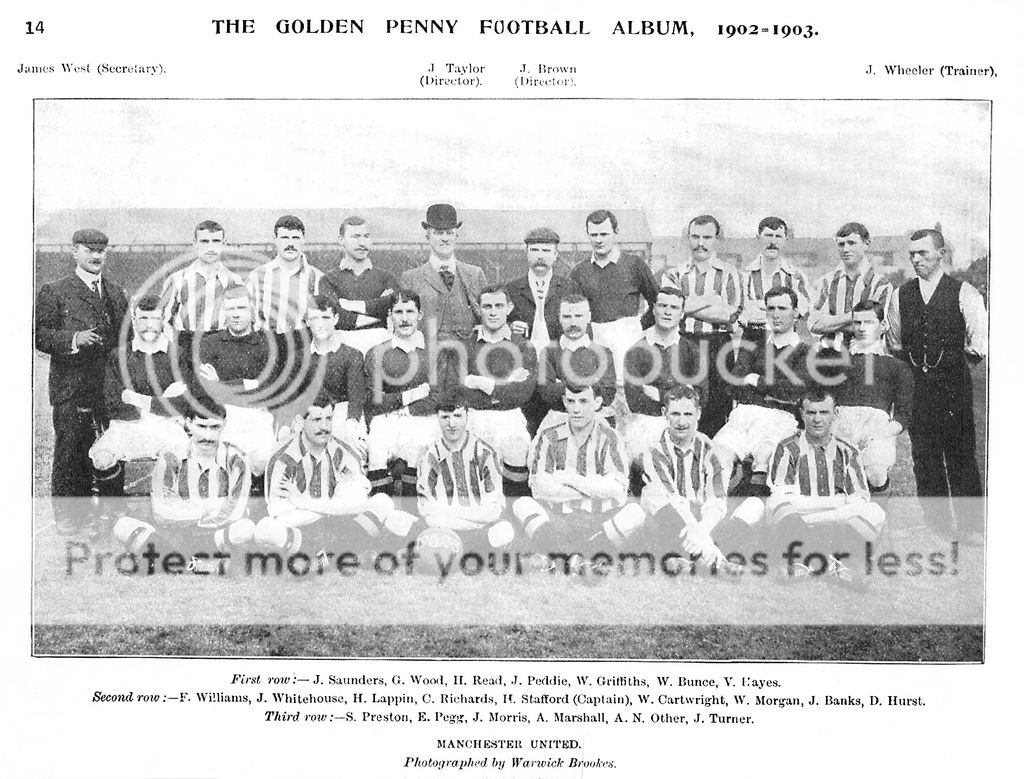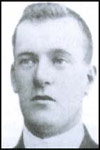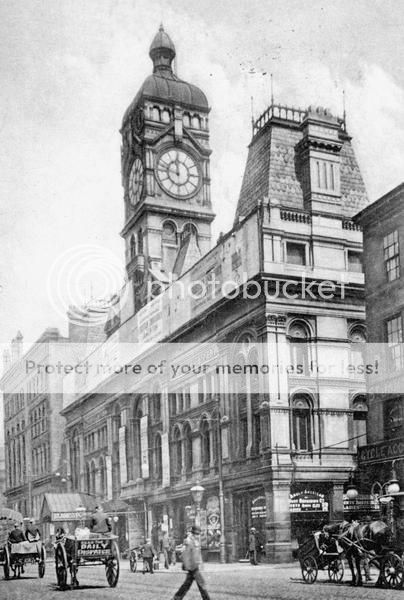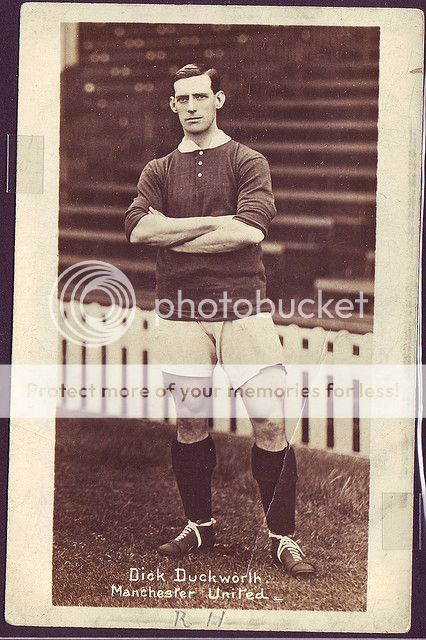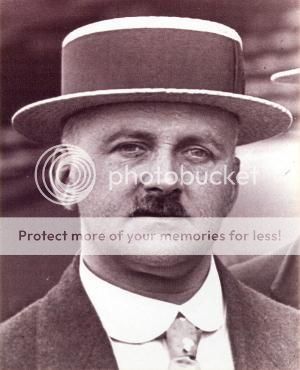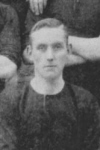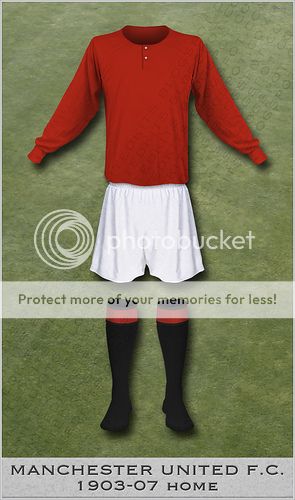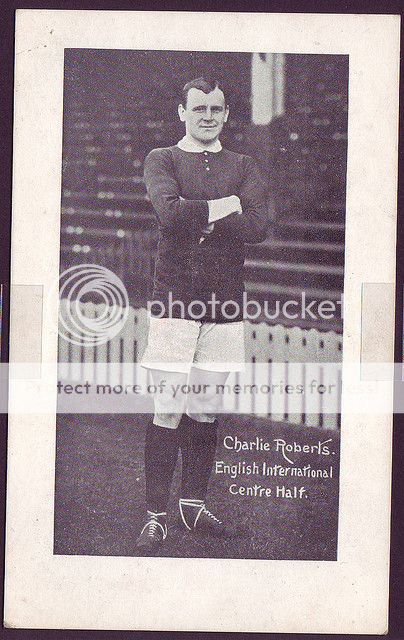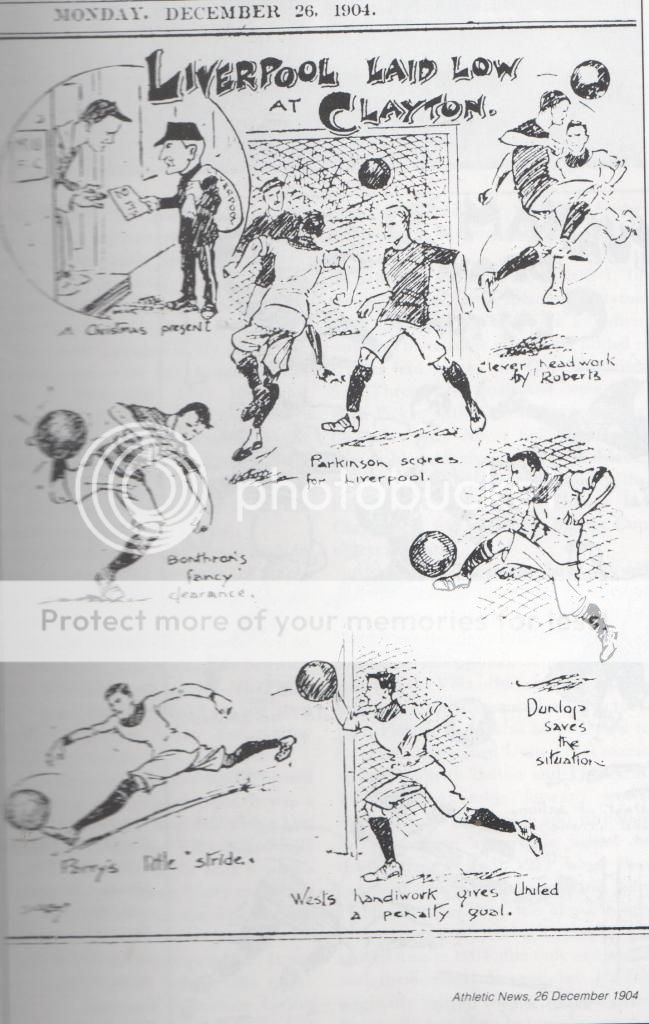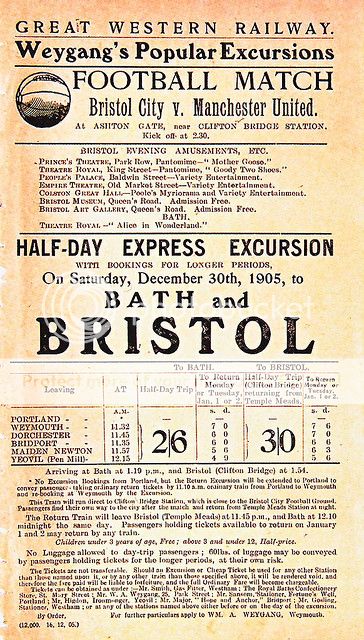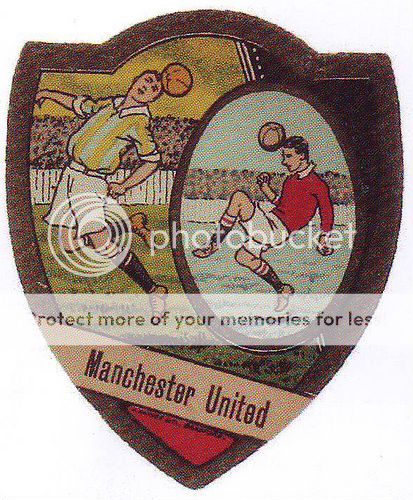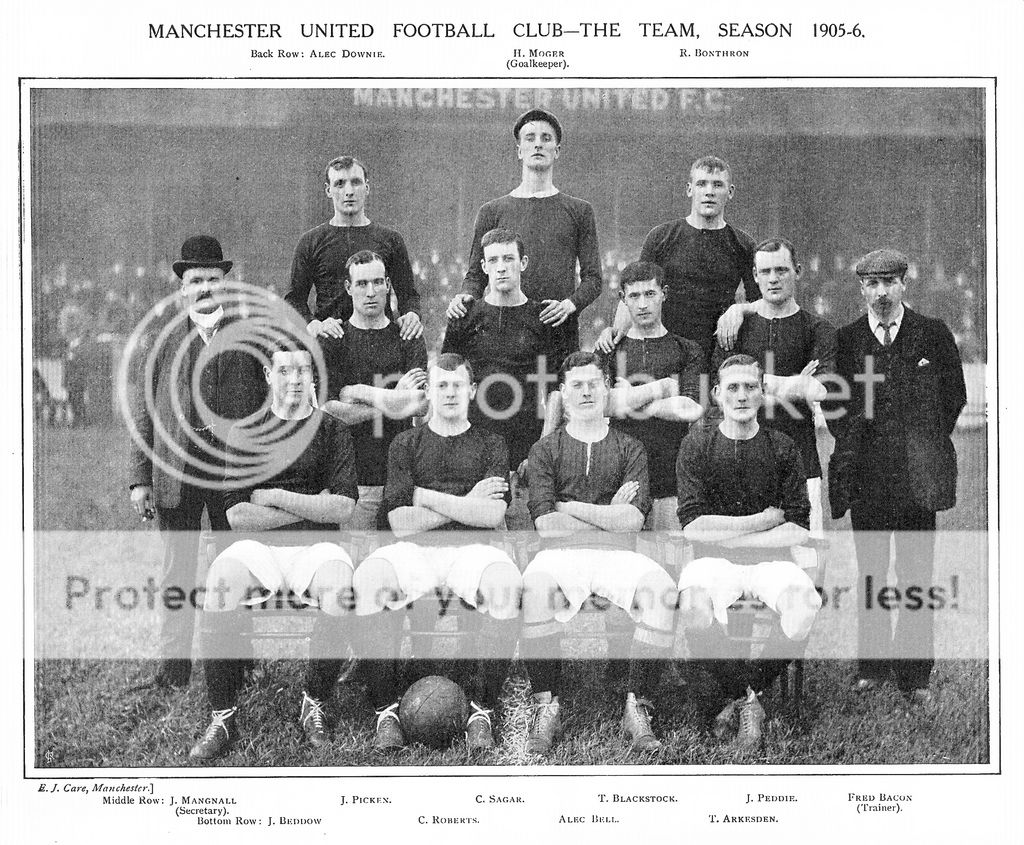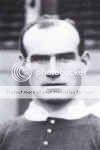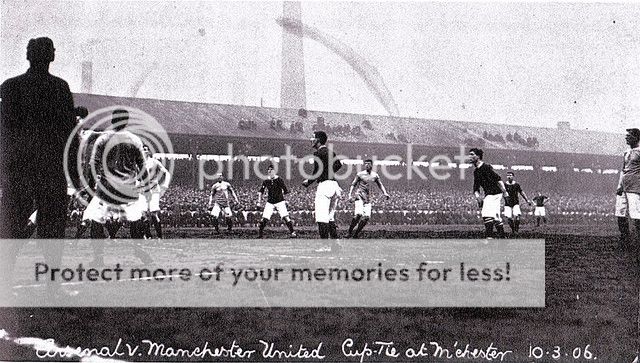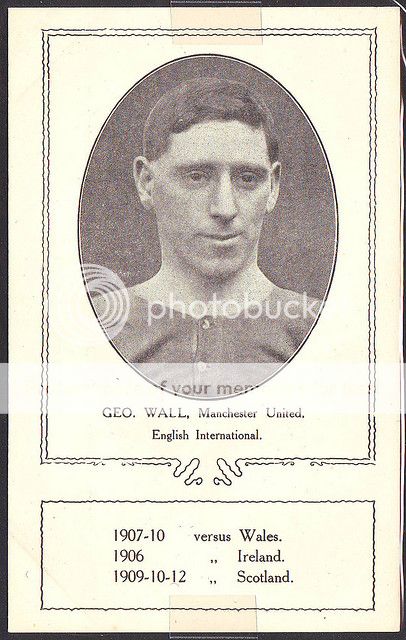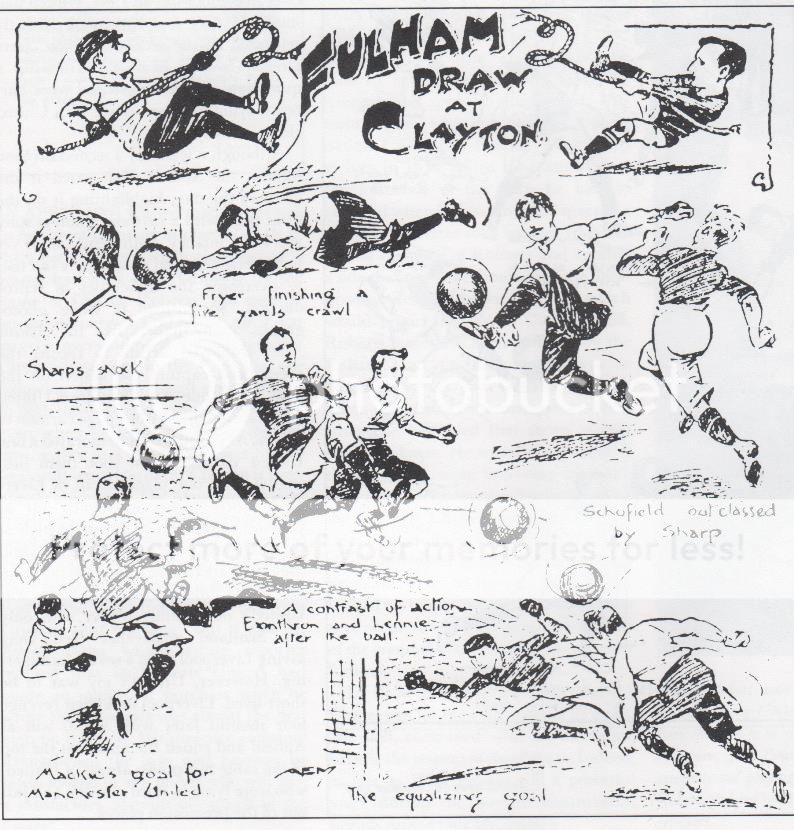iczster
Lord Sugartits (and worst transfer muppet ever)
Update #9 : United Teams through the ages (Manchester United 1901 - 1902)
As mentioned in the previous update, the season 1901-1902 was a turbulent year but also a defining one in the history of our great club.
The 1901–02 season was Newton Heath's tenth season in the Football League and their eighth in the Second Division. They finished 15th in the league, avoiding relegation by only five points. In the FA Cup, the Heathens were knocked out by Lincoln City, losing 2–1 in the Intermediate Round.
The club also entered teams in the Lancashire and Manchester Senior Cups in 1901–02. They only managed to reach the second round of the Lancashire Cup, before losing 5–0 to Southport Central, but the real success came in the Manchester Cup, in which they beat Bolton Wanderers after a replay in the semi-final, before beating Manchester City 2–1 in the final.
The club had been struggling financially during the season, and were taken to court by their president, William Healey, over a sum of £242 17s 10d owed to him by the club in January 1902. Unable to pay, as they were £2,600 in debt, the club was declared bankrupt. Two months later, club captain Harry Stafford managed to enlist the help of Manchester brewer John Henry Davies, who, in conjunction with three other local businessmen, invested a total of £2,000 in the club. Davies was installed as club president and the club was renamed "Manchester United".
Newton Heath at the turn of the century were indeed at their lowest ebb. After a decade in the Football league all they had to show was two years in the top flight (both years finishing at the bottom) and eight years in the second. As mentioned in the previous update it was decided by the directors that new players had to be bought, but there were no funds available so a bazaar was arranged by the club to attempt to raise cash. The event was to start on Wednesday 27th February and run for 4 days, the Manchester Evening News reported that the Northern military and Bess-o'th'-barn Brass bands would be playing. The Bazzar ended on Saturday evening but after paying off the cost of renting the hall it was found that the event had hardly been a success and the funds needed still had not been found. The Club's fortunes then took a strange twist, Harry Stafford the Newton Heath captain owned a St Bernard dog, he had taken the dog to the Bazzar and tied a collecting box around its neck, the dog escaped from the hall and was found wandering the City by a Pub landlord, who showed it to a Mr Henry Davies who was then a managing director of the Manchester Brewers.
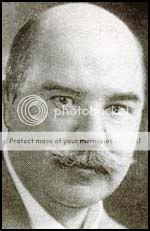
John Henry Davies owned a large brewery in Manchester
Davies took a fancy to the dog and immediatley bought it off the landord. Feeling guilty Davies decided to trace the dog's owner and soon found out that it belonged to the Newton captain, after meeting with Stafford the businessman decided to help and made a financial contribution to the club, and made further promises of help for the future. Stafford did not forget that promise! Mr John Henry Davies would become chairman and president of the club in the future. Newton Heath finished the season worse than last and by the end of the season they stood on a 15th place in the league, with 17 defeats out of 34 games played and a negative goal difference (38-53).
The Manchester Evening News reckoned Healey had been a little impatient, especially as he was president of the club, and pointed out that the directors had gone to some lengths to come to terms with him. But the truth was that Newton Heath were more than £2600 in debt and that was only going to get worse before it got any better.

Manchester Evening News Press Clipping 19th March 1902
The bankrupcy of one of footballs leading clubs caused a sensation. Nevertheless, the directors put on a brave public facem insisting that it did not mean the end of the club. A few good gates might solve the problems they argued, as long as the creditors did not press too hard. Under immediate threat was Saturdays fixture againt Middlesborough at Clayton. Ther were assurances that the game would go ahead as planned and even on the Friday evening the Manchester Evening News informed its readers that the match was on (press clipping above). Unfortunately, the football league and the official receiver intervened and, in an unprecedented step, closed the ground and postponed the fixture.
In the meantime captain Harry Stafford began a campaign to raise the money. Their next fixture, away to Bristol City, was threatened and if the money could not be raised for travelling expenses then the game too would be called off. Quite where that would have left the club us anyone's guess, but its fair to assume two postponed fixtures would have meant the end of Newton Heath. The club was probably 24 hours odd extinction. But the money did come in, not in vast quantities but enough to keep them going.

In this season Newton Heath changed their club colours again, this time the white shirts and blue shorts were replaced by red shirts and white shorts. The name of Newton Heath was not liked by all, they had left their home in Newton Heath 9 years previously, and following the reorganisation of the Club many called for a name change. Manchester Central was suggested, but it was decided that it sounded too much like a railway station, also suggested and rejected was Manchester Celtic, then a Mr Louis Rocca hit upon the name Manchester United. The name had been suggested before but had not met much support, but this time it stuck and on Saturday 26th April 1902 Newton Heath became Manchester United.
This must have pleased many of the visiting teams and supporters who for years had been showing up for games at the old Newton Heath only to find a dilapidated and empty pitch, and then had to dash across town to arrive minutes before the kickoff.
Season Statistics 1901-1902
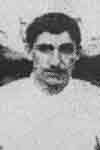
Top goalscorer all competitions 1901-1902 season Stephen Preston
Preston signed professional for the club in 1901 and played for Manchester United until he was sold to Stockport County in 1904. He made his debut on 07/09/1901 versus Gainsborough Trinity (at Bank Street) which United won 3-0.

Rare photograph of the first ever team photo sold on a badge of Manchester United (1902)
Manchester United was born!
To be continued ....
As mentioned in the previous update, the season 1901-1902 was a turbulent year but also a defining one in the history of our great club.
The 1901–02 season was Newton Heath's tenth season in the Football League and their eighth in the Second Division. They finished 15th in the league, avoiding relegation by only five points. In the FA Cup, the Heathens were knocked out by Lincoln City, losing 2–1 in the Intermediate Round.
The club also entered teams in the Lancashire and Manchester Senior Cups in 1901–02. They only managed to reach the second round of the Lancashire Cup, before losing 5–0 to Southport Central, but the real success came in the Manchester Cup, in which they beat Bolton Wanderers after a replay in the semi-final, before beating Manchester City 2–1 in the final.
The club had been struggling financially during the season, and were taken to court by their president, William Healey, over a sum of £242 17s 10d owed to him by the club in January 1902. Unable to pay, as they were £2,600 in debt, the club was declared bankrupt. Two months later, club captain Harry Stafford managed to enlist the help of Manchester brewer John Henry Davies, who, in conjunction with three other local businessmen, invested a total of £2,000 in the club. Davies was installed as club president and the club was renamed "Manchester United".
Newton Heath at the turn of the century were indeed at their lowest ebb. After a decade in the Football league all they had to show was two years in the top flight (both years finishing at the bottom) and eight years in the second. As mentioned in the previous update it was decided by the directors that new players had to be bought, but there were no funds available so a bazaar was arranged by the club to attempt to raise cash. The event was to start on Wednesday 27th February and run for 4 days, the Manchester Evening News reported that the Northern military and Bess-o'th'-barn Brass bands would be playing. The Bazzar ended on Saturday evening but after paying off the cost of renting the hall it was found that the event had hardly been a success and the funds needed still had not been found. The Club's fortunes then took a strange twist, Harry Stafford the Newton Heath captain owned a St Bernard dog, he had taken the dog to the Bazzar and tied a collecting box around its neck, the dog escaped from the hall and was found wandering the City by a Pub landlord, who showed it to a Mr Henry Davies who was then a managing director of the Manchester Brewers.

John Henry Davies owned a large brewery in Manchester
Davies took a fancy to the dog and immediatley bought it off the landord. Feeling guilty Davies decided to trace the dog's owner and soon found out that it belonged to the Newton captain, after meeting with Stafford the businessman decided to help and made a financial contribution to the club, and made further promises of help for the future. Stafford did not forget that promise! Mr John Henry Davies would become chairman and president of the club in the future. Newton Heath finished the season worse than last and by the end of the season they stood on a 15th place in the league, with 17 defeats out of 34 games played and a negative goal difference (38-53).
The Manchester Evening News reckoned Healey had been a little impatient, especially as he was president of the club, and pointed out that the directors had gone to some lengths to come to terms with him. But the truth was that Newton Heath were more than £2600 in debt and that was only going to get worse before it got any better.

Manchester Evening News Press Clipping 19th March 1902
The bankrupcy of one of footballs leading clubs caused a sensation. Nevertheless, the directors put on a brave public facem insisting that it did not mean the end of the club. A few good gates might solve the problems they argued, as long as the creditors did not press too hard. Under immediate threat was Saturdays fixture againt Middlesborough at Clayton. Ther were assurances that the game would go ahead as planned and even on the Friday evening the Manchester Evening News informed its readers that the match was on (press clipping above). Unfortunately, the football league and the official receiver intervened and, in an unprecedented step, closed the ground and postponed the fixture.
In the meantime captain Harry Stafford began a campaign to raise the money. Their next fixture, away to Bristol City, was threatened and if the money could not be raised for travelling expenses then the game too would be called off. Quite where that would have left the club us anyone's guess, but its fair to assume two postponed fixtures would have meant the end of Newton Heath. The club was probably 24 hours odd extinction. But the money did come in, not in vast quantities but enough to keep them going.

Team photograph for the 1901-1902 season (not great quality)
In this season Newton Heath changed their club colours again, this time the white shirts and blue shorts were replaced by red shirts and white shorts. The name of Newton Heath was not liked by all, they had left their home in Newton Heath 9 years previously, and following the reorganisation of the Club many called for a name change. Manchester Central was suggested, but it was decided that it sounded too much like a railway station, also suggested and rejected was Manchester Celtic, then a Mr Louis Rocca hit upon the name Manchester United. The name had been suggested before but had not met much support, but this time it stuck and on Saturday 26th April 1902 Newton Heath became Manchester United.
This must have pleased many of the visiting teams and supporters who for years had been showing up for games at the old Newton Heath only to find a dilapidated and empty pitch, and then had to dash across town to arrive minutes before the kickoff.
Season Statistics 1901-1902
President: William Healey
Secretary: James West
Second Division: 15th
FA Cup: Intermediate Round
Top goalscorer League: Stephen Preston (11)
All: Stephen Preston (11)
Highest home attendance: 13,000 vs West Bromwich Albion (9 November 1901)
Lowest home attendance: 500 vs Burton United (21 April 1902)
Average home attendance: 4,389

Top goalscorer all competitions 1901-1902 season Stephen Preston
Preston signed professional for the club in 1901 and played for Manchester United until he was sold to Stockport County in 1904. He made his debut on 07/09/1901 versus Gainsborough Trinity (at Bank Street) which United won 3-0.

Rare photograph of the first ever team photo sold on a badge of Manchester United (1902)
Manchester United was born!
To be continued ....

